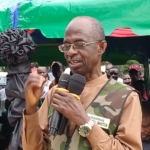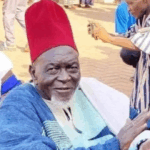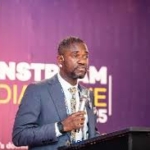
A true General never leaves his troops behind. Asiedu Nketia’s return to the trenches in Ketu North wasn’t politics as usual, it was leadership redefined, honouring loyalty with presence, not promises.
I was in Ketu North. I saw it all. The faces of the young and old, the chiefs in their regalia, the ward coordinators standing tall with pride, and ordinary citizens waving with genuine affection. The love shown to Hon. Johnson Asiedu Nketia during his “Thank You” tour in the Volta Region was not staged. It was organic, heartfelt, and profound.
So the question remains: Is Asiedu Nketia the General who knows the battlefield? From where I sat, observed, and listened, the answer is increasingly clear, yes, but not in the shallow, political sense that many might assume. Rather, he is a General who knows the political terrain, understands the human element of power, and, most importantly, respects the very people whose sweat brings political victory.
One of the long-standing criticisms of Ghanaian politicians is their disappearance after elections. Campaigns bring noise, promises, and slogans, but post-election periods are often marked by silence. Communities, especially in strongholds, are left with faded posters and unmet promises. Asiedu Nketia is changing that narrative. His recent three-day tour of the Volta Region, particularly his visit to Ketu North, wasn’t just symbolic; it was strategic and meaningful.
In Ketu North, Asiedu Nketia demonstrated something that’s becoming increasingly rare in our politics: emotional intelligence. He knew the cultural expectations, he greeted the chiefs properly, acknowledged their constant hospitality, and didn’t rush through protocol. He spoke with sincerity, connecting with people not just on policy but on a human level.
It was a moment of reconnection, a show of leadership, and a powerful reminder that true political power doesn’t come from a title, but from the people who believe in you enough to follow you into battle and welcome you back when the dust settles.
It’s not easy keeping a party as large and diverse as the NDC unified, especially after years in opposition and a return to power that came with high expectations. He did not shy away from the realities either. He reminded party members that not every expectation will be met immediately.
Many within the party want quick fixes, instant rewards, and total satisfaction. But Asiedu Nketia’s message in Ketu North was laced with realism: “Not all expectations will be met in the short term. But if you work to sabotage others, you sabotage yourself. When they fail, your opportunity also dies.”
It’s the kind of message that reminds party members that leadership is a relay, not a sprint. It’s not every day a political leader asks people to support those appointed, even if they were not your preferred candidates. That’s not typical Ghanaian politics. That’s emotional intelligence in leadership.
Another standout moment from the Ketu North stop was the public endorsement of Hon. Eric Edem Agbana, MP for the area. In politics, it’s rare to see senior leaders openly validate younger politicians. But the General didn’t just endorse him, he celebrated him. “I have never regretted working with Hon. Edem Agbana,” he said, adding that the young MP had a great future in Ghanaian politics.
That’s how a battlefield General behaves not just leading the charge but lifting others along the way.
Many remember Asiedu Nketia as the sharp-tongued, no-nonsense General Secretary who could throw political punches with surgical precision. But in his current role as National Chairman, he is revealing a new layer to his leadership: reform and reconciliation.
He’s not just focusing on parliamentary numbers or electoral math. He’s addressing morale, unity, and trust within the party. And he’s doing so by walking the path, literally from constituency to constituency. Leaders often speak of service and humility, but few live it out like he is doing now.
Let’s be clear: the “Thank You” tour is not a mere formality. It’s a reaffirmation of presence and leadership. It’s a calculated decision to keep the grassroots engaged. When Asiedu Nketia stood before the chiefs and people of Ketu North, he didn’t sound like a distant bureaucrat; he sounded like a field commander checking on his troops after a hard-fought victory.
What struck me most in Ketu North wasn’t just what General said, it was how the people responded. You could feel the warmth, the respect, the love. There was dancing, singing, and even emotional moments. In a region that has long been a bedrock of NDC support, the Chairman’s presence felt like a long-awaited reunion between old comrades. It didn’t feel political, it felt personal.
So, is Hon. Johnson Asiedu Nketia the General who knows the battlefield?
Absolutely, but more importantly, he is a General who respects the soldiers, values the terrain, learns from each campaign, and returns to say thank you. That combination of tactical awareness and emotional intelligence is rare and it’s exactly what Ghana needs in these political times.
In an era where politics has become increasingly transactional and self-serving, Johnson Asiedu Nketia is offering an alternative path: relational politics rooted in service, memory, and gratitude.
This is not to say he is perfect or above criticism. Like all leaders, he has his flaws and blind spots. But at a time when the political class is losing touch with the people, his conduct during this tour is a blueprint for how to rebuild trust and party cohesion.
As Rev. Martin Amenaki, the NDC Constituency Secretary and now MCE for Ketu North, rightly captured in his Facebook post today:
“Your presence in Ketu North was not only a moment of pride but also a great source of inspiration… Your message of unity, gratitude, and renewed commitment to the grassroots truly resonated with us.”
He is not perfect. No leader is. But what sets him apart is not just his deep political experience or organisational prowess, it is his intent. His intentional presence in difficult constituencies, his consistent message of unity, and his gratitude for the work done by even the least known party worker are signs of a General who doesn’t just know the battlefield but lives on it.
From what I witnessed in Ketu North yesterday, the answer is a resounding yes. He doesn’t just understand strategy, he understands people. And that, in the end, is the most powerful weapon on any political battlefield.
Let others fight for power. Let the true Generals fight for people.



